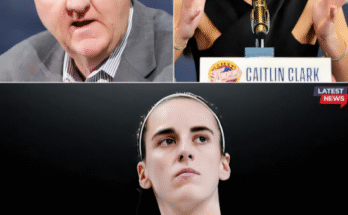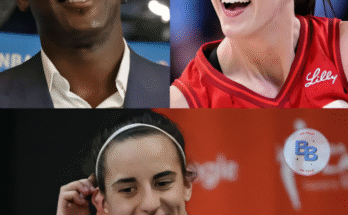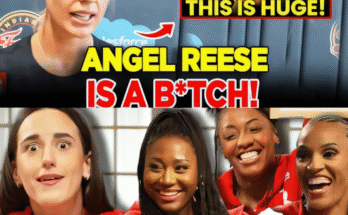In the evolving narrative of women’s basketball, few names command the respect and reverence of Cynthia Cooper and Sheryl Swoopes. Both were pioneers, champions, and household names during the foundational years of the WNBA. But recently, the bond between these legends seemed to fracture—publicly and powerfully—as Cynthia Cooper took to the airwaves to set the record straight, not just about her former teammate Sheryl Swoopes, but to also voice her strong support for the rising star of today’s game: Caitlin Clark.
In a bold and candid interview that quickly made headlines and set social media abuzz, Cooper didn’t mince words. Her tone was firm, her message clear—enough is enough. What began as a passionate defense of Clark turned into a broader conversation about respect, legacy, and the responsibilities that come with being a role model in women’s sports.
The interview, which many have described as “Cynthia Cooper unleashing the truth,” focused on a recent wave of criticism aimed at Caitlin Clark, a young player who has broken records, drawn massive crowds, and reinvigorated the national spotlight on women’s basketball. One of the most vocal critics has been Sheryl Swoopes, who, according to Cooper, hasn’t shown the kind of support and encouragement younger athletes deserve from the sport’s elder stateswomen.
“Caitlin Clark is the real deal,” Cooper began. “She’s not just scoring points—she’s changing the game. She’s putting fans in seats, she’s elevating coverage, and she’s giving young girls someone to believe in. And instead of celebrating that, people want to tear her down?”
The tone shifted from admiration for Clark to frustration with Swoopes. Without hesitation, Cooper expressed disappointment with how her former teammate has been handling the conversation surrounding Clark’s impact. “There’s a way to critique without undermining,” Cooper explained. “Sheryl knows that. We all know that. But what’s been happening isn’t just critique—it feels like resentment. And that doesn’t serve the game.”
Her words struck a chord. For many fans, especially those who watched the WNBA’s birth in the late 1990s, seeing two of its founding stars on opposite sides of a generational debate was both disheartening and illuminating. Cooper’s comments peeled back the curtain on what appears to be a lingering tension among veteran players and the new era of talent dominating headlines.
Yet what Cooper did so effectively was redirect the narrative. Rather than focusing on grudges or personal conflict, she brought the conversation back to what matters: the growth of the game, and the players who are helping make that happen.
“There’s a time when it was just us,” Cooper recalled. “When we were the ones fighting for airtime, fighting for respect. Caitlin doesn’t owe us anything. She’s not here to validate our past—she’s building her own future. And frankly, she’s doing a hell of a job.”
Her defense of Clark wasn’t just rooted in admiration—it was a plea for solidarity. Cooper reminded the public that for the WNBA and women’s basketball at large to thrive, there must be a bridge between generations, not a chasm. The sport’s legends must uplift the rising stars, not stifle them with skepticism or jealousy.
This sentiment has been echoed widely since the interview aired. Fans, analysts, and fellow athletes have taken to platforms like Twitter and Instagram to support Cooper’s stance, thanking her for saying what many have felt: that the old guard must lead with grace, and that dismissing talent out of pride only hurts the collective progress of women’s sports.
Of course, not everyone agrees. Some have defended Swoopes’ right to critique Clark, pointing to nuanced issues such as media bias, representation, and the importance of challenging narratives that may elevate one player at the expense of others. Cooper herself acknowledged these concerns, but stressed that tone, timing, and intention matter.
“It’s okay to ask tough questions,” she said. “But ask them from a place of love for the game—not from a place of bitterness.”
As Caitlin Clark continues to shine—breaking records, earning endorsements, and drawing the kind of crowds once unimaginable in women’s basketball—the spotlight will continue to burn brightly. And with it comes the heat of scrutiny. But if the legends of the game can come together in support rather than in opposition, then the sport as a whole will benefit.
Cooper’s words resonated because they weren’t just about Clark or Swoopes. They were about what it means to be a leader, both on and off the court. Her interview reminded everyone that legacy isn’t just defined by championships or points scored—it’s defined by how you shape the future.
For many, this moment marks a turning point. The tension between past and present stars has been building quietly for years, but now it’s out in the open. What comes next—whether it’s reconciliation, collaboration, or continued division—will set the tone for how women’s basketball evolves in this new era.
In the meantime, Cooper’s message is clear. Caitlin Clark has earned her place. And it’s time the sport embraces her for what she represents: not just a star in the making, but a symbol of where the game is headed.
Because in the end, greatness is not threatened by the rise of others—it’s defined by how we rise together.


